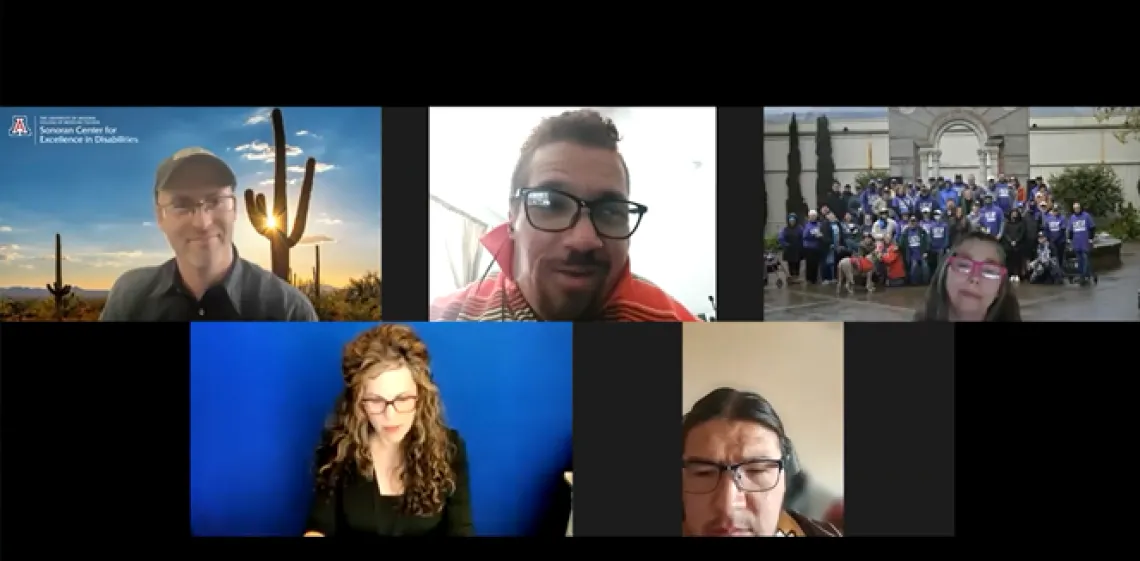Moving Forward Together
Webinar Series Addresses Social Life After Traumatic Brain Injury

For people who have survived Traumatic Brain Injuries (TBI), their challenges don’t end when they leave the hospital. Rather, they are taking the first steps on a long journey of learning how to live their lives with TBI.
Alone, this situation can often seem insurmountable, but the more support and care they receive from people in their lives (family, friends, and even strangers) the easier it becomes.
This was the focus of a June virtual webinar series called “Moving Forward: Navigating a Social Life with TBI” by Austin Duncan.
In the medical field, attention and research is often focused on the medical care people receive immediately following their TBI. However, the social support that TBI survivors do or do not receive in the months and years after they are released from the hospital have a significant impact on their quality of life.
Duncan explained the importance of understanding the social life of people living with TBI. Duncan says that the key to grasping how TBI survivors move through the world is the idea that their disability is primarily socially-defined, rather than medically-defined.
"This means that living “with TBI” is the true disability, rather than the injury itself. This encompasses not only the TBI survivors themselves, but also the people around them: their family, friends, coworkers, and neighbors all live “with TBI” indirectly as well," he says.
Duncan refers to a TBI survivor's family, friends, coworkers and neighbors as significant others. Not romantic partners but the broader social circle of the survivor. Significant others largely define the course of the disability by establishing how easy or difficult it is to access the resources and connections that allow people to accomplish tasks and make progress on goals.
Duncan was joined by a panel of TBI survivors who were invited to give their thoughts on his presentation and participate in an open discussion. The panelists were Calvin Cook, Michelle Kauffman, and Mateo Treetop. The panel covered a broad range of topics relating to the ways people with Traumatic Brain Injuries re-adjust to social life following their injuries.
Among the topics covered were: How to build and maintain new social connections, organizations and programs that have helped them, positive and negative experiences survivors had with significant others, and personal practices that help in daily life.
One of the questions asked of the panel was: “Who are significant others in your life and how did they help?”
Michele credited her husband of 30 years and two adult children. They helped her accomplish tasks that many would characterize as “self-care”, like brushing her teeth and changing bandages, immediately after her injury. In addition to their direct support, their emotional support and selflessness in stepping up to help her even when they may not have wanted to was tremendously uplifting and inspiring for her.
Calvin said the camaraderie he found in the disability community was one of his most important sources of support. The fellowship and belonging he found in the broader community of people with disabilities helped him make his way back into social life and doing the things he loves - like making music. He was inspired and encouraged to see others surviving and doing amazing things with their disadvantages, as he put it, and their courage helped give him the resolve to join the panel and tell his own story.
For Mateo, his sources of support were both close to home and out in the community. His mother was there for him from the start: she was looking up resources on TBI and ways to help while he was still in the hospital. He also found support in the Arizona Youth Leadership Forum, which helps people with disabilities transition into adulthood. As the months passed, Mateo’s mother and the leadership forum taught him to advocate for himself and be productive and active as a person with a disability.
The panelists were also asked what they’d like others to know about the social life of TBI. The desire to be listened to and heard was a common thread.
Michele said she would rather have a doctor who truly cares about her and listens to her than the best doctor in the world. Mateo said that giving people a chance to be heard even when their voices aren’t the loudest is one of the most important things people can do. Calvin emphasized that people with TBI, or other disabilities, are still people with their own dreams, goals, and aspirations, and that encouraging them in their pursuit of those dreams is invaluable.
Ultimately, Duncan explains, there is a ray of hope in the fact that significant others can make an incredible difference in the lives of TBI survivors.
As he put it: “Others make the difference, others can make it better”. We can all work to make things easier for TBI survivors in our own ways, and in doing so help our communities become a place where every member can fully thrive.
Funding was made possible in part by the Arizona Governor's Council on Spinal and Head Injuries. The views expressed do not necessarily reflect the official policies of the Arizona Governor's Council on Spinal and Head Injuries.
